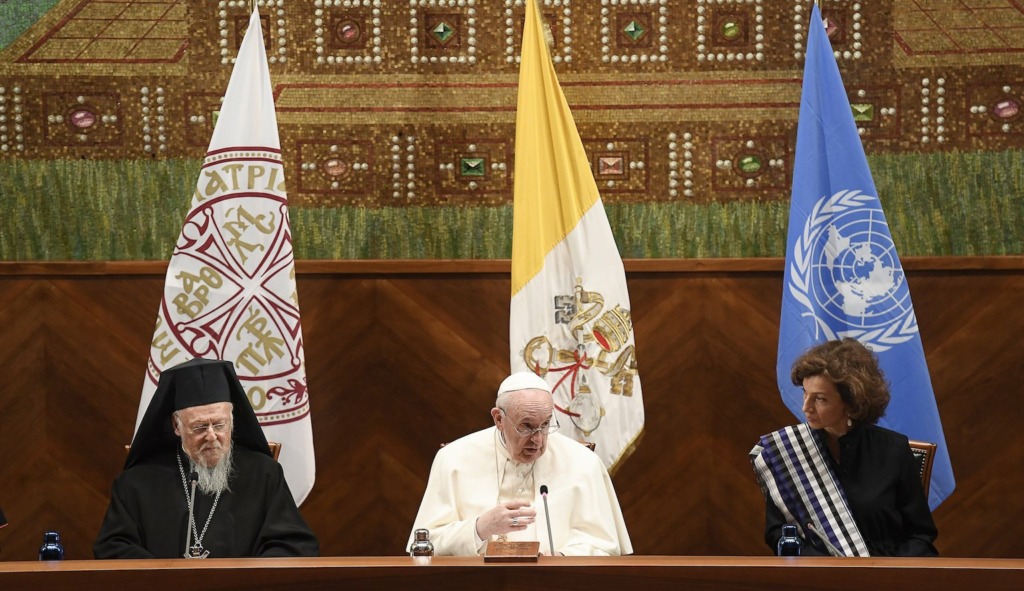ROME — Academic institutions need to promote an “ecological conversion” that combines natural and social sciences with theology, philosophy and ethics to help humanity safeguard creation, Pope Francis said.
Responding to current challenges requires a new way of learning and doing that is built on “openness, creativity, wider educational offerings, but also sacrifice, dedication, transparency and honesty in choosing, especially in these difficult times,” he said at Rome’s Pontifical Lateran University Oct. 7.
“Let’s permanently ditch this — ‘it has always been done this way’ — it’s suicide,” he said, and it does not lead to any credibility “because it creates superficiality and answers that are valid only in appearance,” he said at the launch of a new chair and program of studies at the school.
Pope Francis and Audrey Azoulay, director-general of UNESCO, signed an agreement at the event establishing a new theological chair supported by UNESCO “On Futures of Education for Sustainability” at the pontifical university. The signing coincided with the launch, together with Ecumenical Patriarch Bartholomew of Constantinople, of a new academic program dedicated to “Care for our common home and safeguarding creation.” Both initiatives are endorsed by the Catholic and the Eastern Orthodox churches.
Patriarch Bartholomew said the initiatives reflect the collaboration between the two “sister churches” and their commitment to work to protect “God’s wonderful universe.” They also reflect a needed interreligious and interdisciplinary approach to the urgent environmental challenges of today, especially concerning climate change, he added.
The chair will encompass the fields of theology, philosophy, law and socioeconomic aspects “in order to train and shape students (in) how to respond to the ecological crisis in a collaborative and conscientious manner,” he said.
Pope Francis praised the patriarch’s decades long dedication to promoting safeguarding creation, quoting the patriarch’s conviction that safeguarding “is a way of loving, of moving gradually away from what I want to what God’s world needs. It is liberation from fear, greed and compulsion.”
Addressing the complexity of threats to the planet, its inhabitants and the most vulnerable requires “responsibility, practicality and competence,” the pope said.
The original mission of every university was to be a place where students and teachers dedicated to diverse fields of study could come together to discuss and find creative ways forward, he said. Today, he said, this includes forming an “ecological conscience” and developing research on how to best protect creation.
“Academic activity is called to promote integral ecological conversion to protect the splendor of nature” by merging social and natural sciences with theological, philosophical and ethical reflection so as to impact regulations and legal standards as well contribute to “a healthy economic vision,” Pope Francis said.
The aim includes protecting creation “from nefarious deeds, perhaps inspired by policies, an economy and formation tied to immediate results that benefit a few,” he added.
In a letter addressed to Cardinal Angelo De Donatis, grand chancellor of the Pontifical Lateran University, formally instituting the school’s new program of studies and chair, the pope wrote they reflect the Church seeking to live up to its duty to protect creation.
“We, believers and nonbelievers, have the duty to guarantee not an abstract (form of) sustainability or to proclaim the good of future generations, but to develop the tools for safeguarding diverse ecosystems” in ways that are scientifically valid and culturally courageous, he wrote.
The pope wrote that the new chair and studies in safeguarding creation are also meant to benefit Church organizations, consecrated life, religious associations and movements and anyone who wishes “to acquire that conscience, knowledge and environmental competence needed for a commitment inspired by a just and sustainable model of the human being, life, society and a relationship with nature.”

